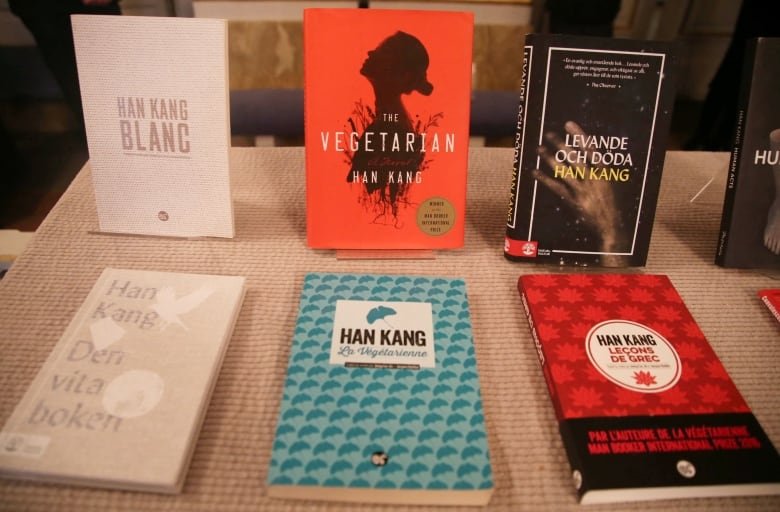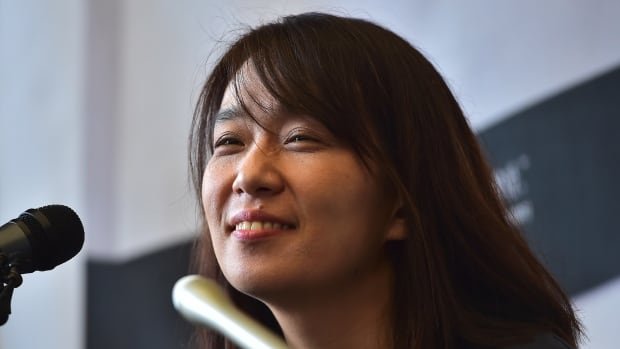South Korean author Han Kang won the 2024 Nobel Prize in Literature for “for her intense poetic prose that confronts historical traumas and exposes the fragility of human life,” the award-giving body said on Thursday.
“She has a unique awareness of the connections between body and soul, the living and the dead, and in her poetic and experimental style has become an innovator in contemporary prose,” said Anders Olsson, chairman of the academy’s Nobel Committee, in a statement.
Han, the first South Korean to win the literature prize, began her career in 1993 with the publication of a number of poems in the magazine Literature and Society, while her prose debut came in 1995 with the short story collection Love of Yeosu.
In a telephone interview with the Academy after the prize was announced, she said her celebrations would be low-key. “After this phone call I’d like to have tea with — I don’t drink, so I’m going to have tea with my son, and I’ll celebrate it quietly tonight.”
Han said she had just finished dinner when she heard from the Academy. She said she was “so surprised and … absolutely I’m honoured.”
Born in 1970, she comes from a literary background, her father being a well-regarded novelist.
Author feels ‘awkward’ about The Vegetarian’s success
Han won the Man Booker International Prize in fiction for her novel The Vegetarian in 2016, the first of her novels to be translated into English and regarded as her major international breakthrough.
Throughout her writing, Han has explored the themes of grief, violence, sexuality and mental health.
In The Vegetarian, after struggling with gruesome recurring nightmares, Yeong-hye, a dutiful wife, rebels against societal norms, forsaking meat and stirring concern among her family that she is mentally ill.
“She is exploited erotically and esthetically by her brother-in-law, a video artist who becomes obsessed with her passive body [and] … sinks ever deeper into a psychosis-like condition expressed through the ‘flaming trees’, a symbol for a plant kingdom that is as enticing as it is dangerous,” reads the Academy’s description.
In an interview with the Booker Prizes published last year, Han described how the writing of The Vegetarian had been a difficult period in her life where she questioned whether should be able to finish the novel or even survive as an author.
“I was suffering from severe arthritis in my fingers, so I wrote the first two parts at a leisurely pace, using a felt-tip pen that glided smoothly across the paper, and then typed out the last part holding two ballpoint pens upside down,” she said.
“To this day, I feel awkward when I hear about the novel’s ‘success.'”
Exploring historical trauma
Her focus on historical trauma is explored in the novel Human Acts through the 1980 massacre of hundreds of students and unarmed civilians by the South Korean military following a coup d’état in the city of Gwangju, where she herself grew up.
Han told Sweden’s DN daily in an interview in 2017 the events had left her family struggling with survivors’ guilt for years, after they had left the area a few months before the killings.
In We Do Not Part, her latest novel due to be published in English in 2025, Han “conveys the power of the past over the present,” and she chose it when asked in the telephone interview with the Academy which book readers new to her work should start with.

“I think every writer likes his or her most recent book,” Han said. “Human Acts is connected directly with this book. And then The White Book which is very personal book for me, because it is quite autobiographical. And there is The Vegetarian, but I feel the start could be We Do Not Part.”
South Korea’s President Yoon Suk Yeol congratulated Han in a Facebook post: “You have turned the painful scars of our modern history into great pieces of literature.”
Two of her books have been made into films: The Vegetarian in 2009, directed by Lim Woo-Seong, and 2011’s Scars, by the same director.
Her 2002 novel Your Cold Hands, which contains clear glimpses of Han’s interest in art, “reproduces a manuscript left behind by a missing sculptor who is obsessed with making plaster casts of female bodies,” the Academy said in an official biography.
Her 2011 novel Greek Lessons was her most recent English-language release, with the translated version published last year.
“There is a preoccupation with the human anatomy and the play between persona and experience, where a conflict arises in the work of the sculptor between what the body reveals and what it conceals,” the biography says.
The prize is awarded by the Swedish Academy and is worth 11 million Swedish krona, the equivalent of $1.45 million Cdn.
Prestigious past winners
The Nobel Prize was created by wealthy Swedish inventor Alfred Nobel, who in his will dictated that his estate should be used to fund “prizes to those who, during the preceding year, have conferred the greatest benefit to humankind.” The first awards were given out in 1901.
Past literature winners have included Rudyard Kipling, George Bernard Shaw, Herman Hesse, Ernest Hemingway, Pablo Neruda and Toni Morrison. Last year’s Nobel was awarded to Norwegian author and dramatist Jon Fosse.
Over the years, the literature prize has also picked winners well beyond the novelist tradition, including playwrights, historians, philosophers and poets, even breaking new ground with the award to singer-songwriter Bob Dylan in 2016.
The Nobel prizes are presented to the laureates on Dec. 10, the anniversary of Nobel’s death.
The Nobel Peace Prize will be announced by the chairman of the Norwegian Nobel committee in Oslo on Friday, with the Nobel committee announcing this year’s economic sciences award on Monday.




